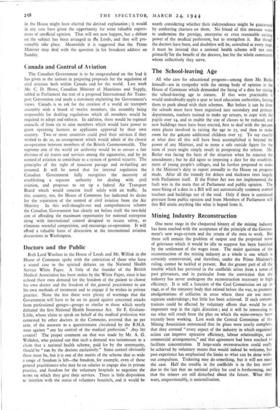The School-leaving Age
All who care for educational progresi—among them Mr. Butler himself—are in sympathy with the strong body of opinion in the House of Commons which demanded the fixing of a date for raising the school-leaving age to sixteen. If that were practicable it would undoubtedly apply a spur to local education authorities, forcing them to push ahead with their schemes. But before it can be done the schools must have been organised into secondary and primary departments, teachers trained to make up arrears, to cope" with the pupils over 54, and to enable the size of classes to be reduced, and new buildings must have been erected, first to deal' with the 391,000 extra places involved in raising the age to 15, and then to make room for the 406,000 additional children over 15. To say exactly at what date all this will have been accomplished is beyond the power of any Minister, and to name a safe outside figure for the term of years might simply result in postponing the reform. Mr. Butler was facing the facts of the situation when he rejected the amendment ; but he did agree to imposing a date for the establish- ment of young people's colleges, and he further proposed to make it the Minister's duty to report annually to the House on progress made. After all the remedy for delays and slackness rests largely with Parliament itself. If the Fisher Act was not implemented, the fault was in the main that of Parliament and public opinion. The mere.fixing of a date in a Bill will not automatically summon trained teachers and buildings out of the •void. Only if there is continued pressure from public opinion and from Members of Parliament will this Bill attain anything like what is hoped from it.


























 Previous page
Previous page